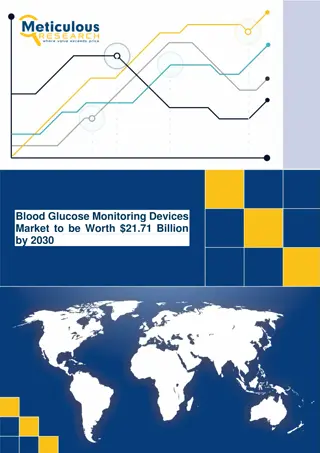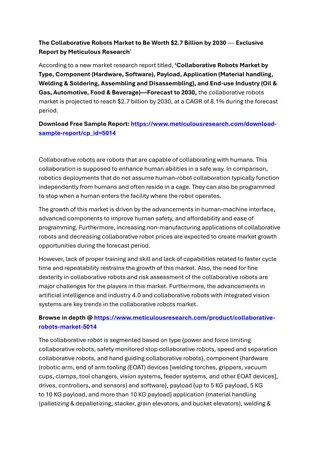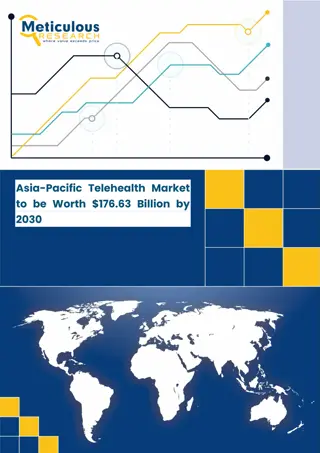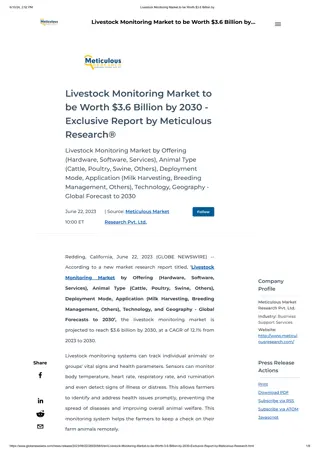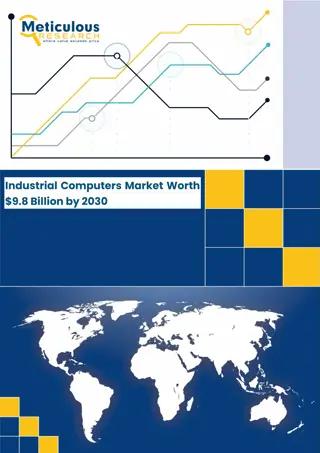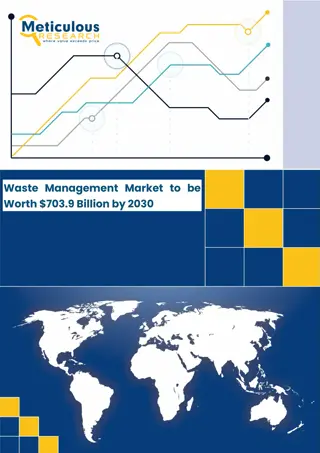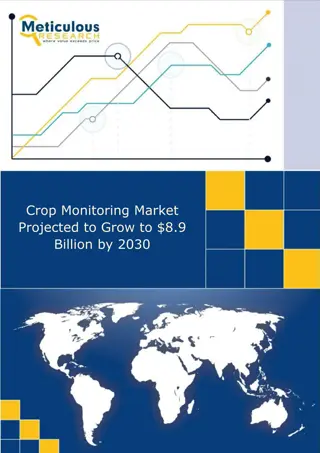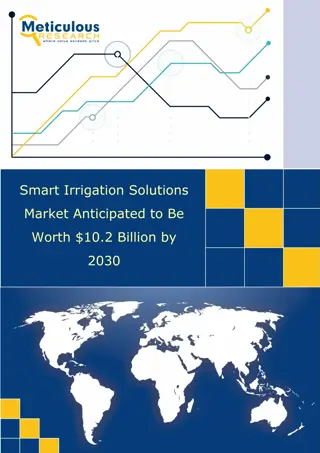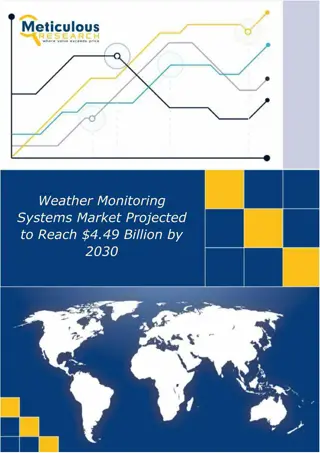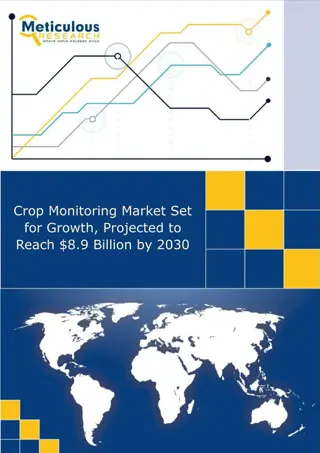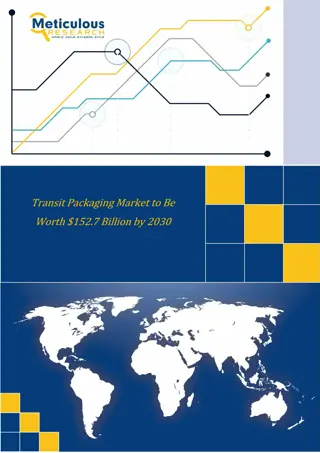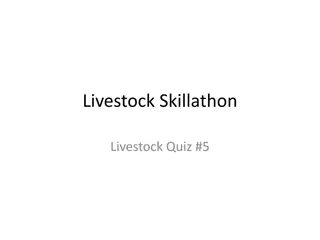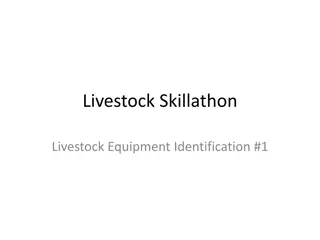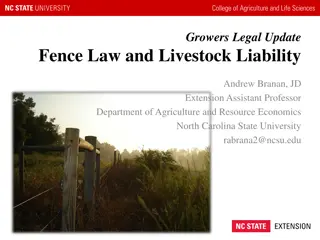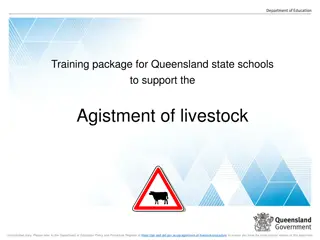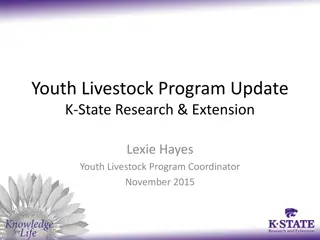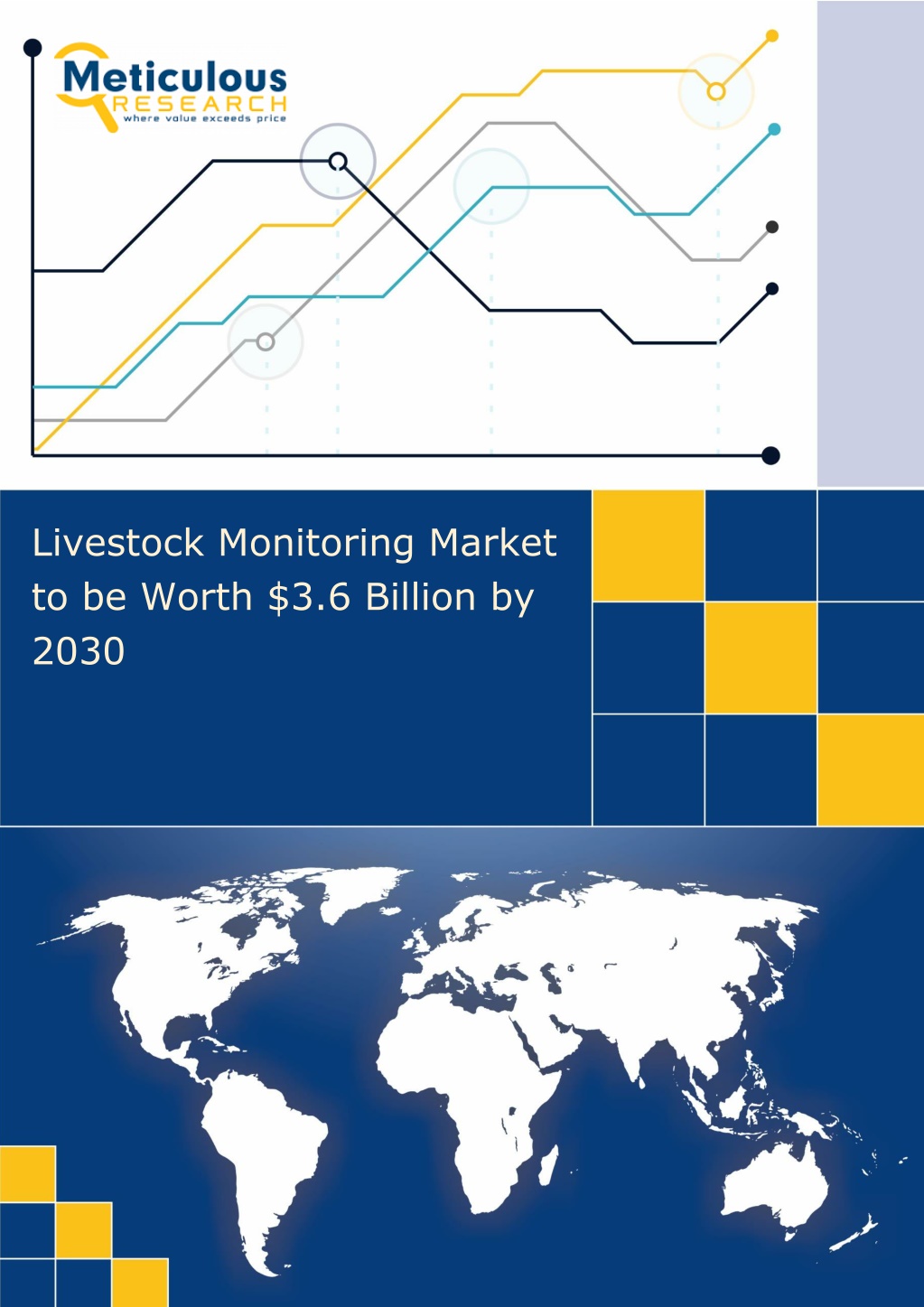
Livestock Monitoring Market to be Worth $3.6 Billion by 2030
Livestock monitoring systems can track individual animals' or groups' vital signs and health parameters. Sensors can monitor body temperature, heart rate, respiratory rate, and rumination and even detect signs of illness or distress.
Download Presentation

Please find below an Image/Link to download the presentation.
The content on the website is provided AS IS for your information and personal use only. It may not be sold, licensed, or shared on other websites without obtaining consent from the author. Download presentation by click this link. If you encounter any issues during the download, it is possible that the publisher has removed the file from their server.
E N D
Presentation Transcript
Livestock Monitoring Market to be Worth $3.6 Billion by 2030
Global Livestock Monitoring Market 2023-2030 According to this latest publication from Meticulous Research , the livestock monitoring market is projected to reach $3.6 billion by 2030, at a CAGR of 12.1% from 2023 to 2030. Some of the major factors driving the growth of this market are the increasing adoption of livestock monitoring for early disease detection, and the rising number of dairy, poultry and swine farms. In addition, the growing adoption of IoT and AI in livestock monitoring provides market growth opportunities. However, the high cost of livestock monitoring solutions and the lack of understanding of technology among farmers can restrain the growth of this market. The livestock monitoring market is segmented by offering, animal type, deployment mode, application and technology. The study also evaluates industry competitors and analyzes the regional and country-level markets. Based on offering, the livestock monitoring market is segmented into hardware, software, and services. In 2023, the software segment is expected to account for the largest share of the global livestock monitoring market. The large share of the segment is attributed to the growing amount of data generated from sensors, RFID tags, neck collars, and surveillance cameras to track & monitor the health of livestock and keep a check on their farm animals, manage herds in remote locations, customize diet and care, and reduce livestock theft in real-time. Based on animal type, the livestock monitoring market is segmented into cattle, poultry, swine, equine and other animal types. In 2023, the cattle segment is expected to account for the largest share of the global livestock monitoring market. The large share of this segment is attributed to the increase in the consumption of dairy products. According to the OECD (France), the world's per capita consumption of fresh dairy products is projected to increase by 1.0% p.a. over the next decade. In addition, the growing need to ensure the safety and quality of these products and the prevention of disease transmission are the drivers for market growth. However, the poultry segment is expected to record the highest CAGR during the forecast period. Based on deployment mode, the livestock monitoring market is segmented into on-premise and cloud-based deployments. In 2023, the on-premise segment is expected to account for the larger share of the global livestock monitoring market. The large market share of this segment is attributed to a high preference for on-premise livestock monitoring devices among large enterprises, security issues associated with cloud deployments, and the availability of trained IT professionals & infrastructure. However, the cloud-based segment is expected to record the highest CAGR during the forecast period. Based on application, the livestock monitoring market is segmented into milk harvesting, breeding management, feeding management, animal health monitoring & comfort, heat stress, behavior monitoring and other applications. In 2023, the feeding management segment is expected to account for the largest share of the global livestock monitoring market. The need for continuous access to water and feed and for keeping animals' living Page 1 of 3 Meticulous Research| sales@meticulousresearch.com
Global Livestock Monitoring Market 2023-2030 areas clean is increasing. Proper feeding and manure handling are vital for veterinary health, comfort, and well-being, but also for reducing disease, illness, and parasites. However, the milk harvesting segment is expected to record the highest CAGR during the forecast period. Based on technology, the livestock monitoring market is segmented into IoT, artificial intelligence, big data analytics, GPS, and other technologies. In 2023, the IoT segment is expected to account for the largest share of the global livestock monitoring market. The large share of the segment is attributed to the rising need to monitor the health and vitality of livestock in real-time, enabling farmers to quickly treat animals and prevent the spread of disease, monitor grazing patterns and nutritional changes, track grazing animals, gather and analyze historical data to identify trends in cattle health, optimizing breeding practices. However, the segment is also expected to record the highest CAGR during the forecast period. Based on geography, the livestock monitoring market is segmented into North America, Asia-Pacific, Europe, Latin America, and the Middle East & Africa. In 2023, North America is expected to account for the largest share of the livestock monitoring market. The large segment share is attributed to the rising consumption of meat. According to the data published by Organization for Economic Cooperation and Development, in 2021, it has been estimated that 48,602 kt cwe meat will be consumed by 2030 in North America, accounting for 44,949 kt cwe in the U.S. and 3,653 cwe in Canada. According to the Food and Agriculture Organization of the United Nations (UNFAO), the U.S. is the world's largest producer of chicken meat, producing 20.4 million metric tons of broiler meat in 2021. In addition, the prevalence of zoonotic diseases has fueled the demand for technology to monitor sick animals, which is anticipated to drive the North American market. However, Asia-Pacific is slated to register the highest CAGR during the forecast period. Key Players: The key players operating in the livestock monitoring market are GEA Group Aktiengesellschaft (Germany), Afimilk Ltd. (Israel), a subsidiary of Kibbutz Afikim - Agricultural Cooperative Society Ltd. (Israel), DeLaval (Sweden), a subsidiary of Tetra Laval (Switzerland), Sensaphone (U.S.), BouMatic (U.S.), DAIRYMASTER (Ireland), Lely (Netherlands), Fancom BV (Netherlands), Fullwood JOZ Ltd (U.K.), Communications Group Lethbridge (Canada), Merck & Co., Inc. (U.S.), HID Global Corporation (U.S.), Hokofarm Group (Netherlands), Nedap Livestock Management (Netherlands), ENGS Systems (Israel), CowManager B.V. (Netherlands), HerdInsights (Ireland), and Zoetis Inc. (U.S.). Download Sample Report Here @ https://www.meticulousresearch.com/download-sample- report/cp_id=5530 Page 2 of 3 Meticulous Research| sales@meticulousresearch.com
Global Livestock Monitoring Market 2023-2030 Key questions answered in the report- Which are the high-growth market segments based on offering, animal type, deployment mode, application, and technology? What was the historical market for livestock monitoring solutions? What are the market forecasts and estimates for the period 2023 2030? What are the livestock monitoring market's major drivers, restraints, and opportunities? Who are the major players, and what shares do they hold in the livestock monitoring market? Contact Us: Meticulous Research Email- sales@meticulousresearch.com Contact Sales- +1-646-781-8004 Connect with us on LinkedIn- https://www.linkedin.com/company/meticulous- research Page 3 of 3 Meticulous Research| sales@meticulousresearch.com


